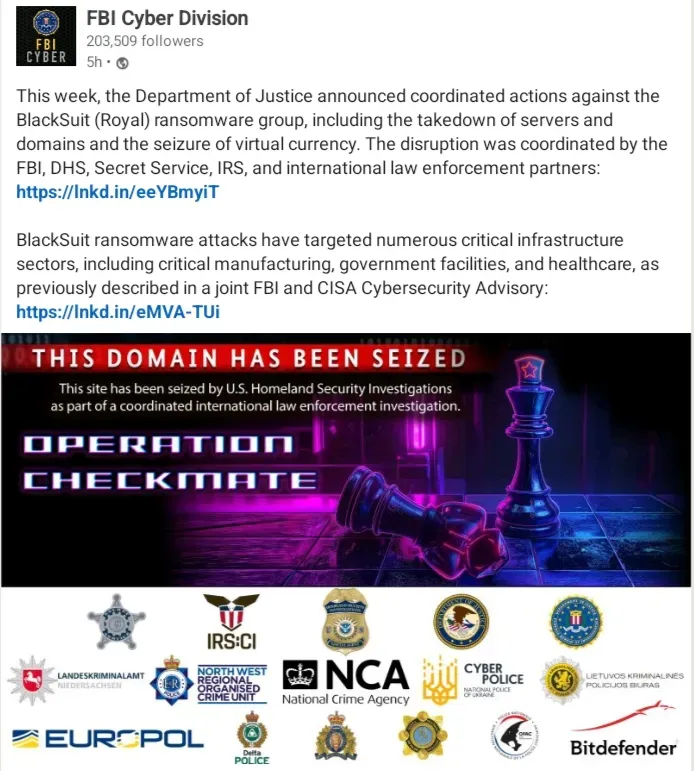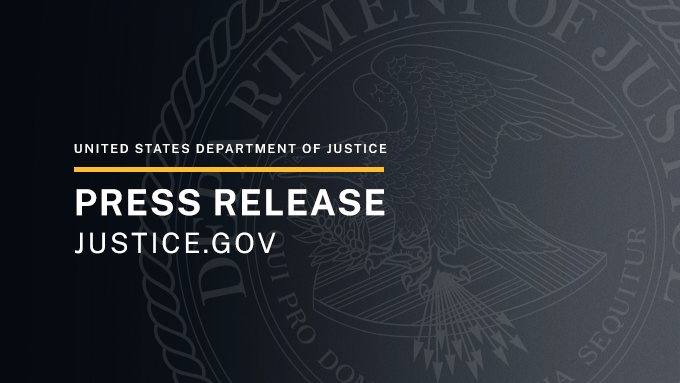Operation Checkmate: International Law Enforcement Dismantles BlackSuit Ransomware Empire

Major cybercriminal organization responsible for over $500 million in ransom demands finally brought down in coordinated global action
In a landmark victory against cybercrime, international law enforcement agencies have successfully dismantled the critical infrastructure of BlackSuit ransomware, one of the most destructive cybercriminal operations of recent years. The coordinated takedown, dubbed "Operation Checkmate," represents the culmination of months of investigation and marks a significant blow to the global ransomware ecosystem.

https://www.ic3.gov/CSA/2024/240807.pdf
The Scale of BlackSuit's Criminal Enterprise
BlackSuit, which emerged as a rebrand of the notorious Royal ransomware in 2023, has compromised over 450 victims across the United States since 2022, targeting essential services including healthcare systems, educational institutions, public safety organizations, energy infrastructure, and government agencies. Combined with its predecessor Royal, the operation extracted more than $370 million in cryptocurrency payments from victims.
The ransomware group's tactics were particularly sophisticated, employing a unique partial encryption approach that allowed threat actors to choose specific percentages of data to encrypt, helping them evade detection while maintaining speed. BlackSuit's ransom demands typically ranged from $1 million to $10 million in Bitcoin, with the highest recorded demand reaching $60 million.
Operation Checkmate: A Global Response
The takedown operation, coordinated by the U.S. Department of Homeland Security's Homeland Security Investigations (HSI) and Europol, involved an unprecedented level of international cooperation. The operation included law enforcement agencies from the United Kingdom, Germany, Ireland, France, Canada, Ukraine, and Lithuania, demonstrating the global commitment to combating ransomware threats.
On July 24, 2024, authorities successfully seized four servers and nine domains used by BlackSuit to deploy ransomware, extort victims, and launder criminal proceeds. The seized infrastructure included dark web data leak sites and negotiation platforms that BlackSuit used to pressure victims into paying ransom demands.
Financial Recovery and Asset Seizure
In a significant development announced this week, the Justice Department revealed the unsealing of a warrant for the seizure of virtual currency valued at $1,091,453 at the time of seizure. These funds originated from a ransom payment made on April 4, 2023, when a victim paid 49.31 Bitcoin (worth approximately $1.45 million at the time) to decrypt their data.
A portion of these proceeds was repeatedly deposited and withdrawn into a virtual currency exchange account before being frozen by the exchange in January 2024, demonstrating how law enforcement can track and recover cryptocurrency used in cybercriminal activities.
The Evolution of BlackSuit
BlackSuit emerged as the evolution of Royal ransomware, which operated from approximately September 2022 through June 2023. Security experts believe BlackSuit likely evolved from earlier ransomware groups, possibly linked to the defunct Conti syndicate, showing how these criminal organizations adapt and rebrand to evade law enforcement.
The group conducted data exfiltration and extortion prior to encryption, using phishing emails as their most successful initial access vector. After gaining network access, BlackSuit actors would disable antivirus software and exfiltrate large amounts of data before deploying ransomware and encrypting systems.
Notable Victims and Impact
BlackSuit's victims span critical sectors across the economy. In April 2024, the gang claimed responsibility for an attack against blood plasma collection organization Octapharma, which resulted in the temporary closure of almost 200 blood plasma collection centers across the country. Other notable victims included Japanese company Kadokawa, Tampa Bay Zoo, and CDK Global, which provides software to approximately 15,000 North American car dealerships.
The majority of BlackSuit's victims were based in the U.S., with the most impacted industries including manufacturing, education, healthcare, and construction.
Law Enforcement Statements
The operation has drawn praise from senior officials across multiple agencies. "The BlackSuit ransomware gang's persistent targeting of U.S. critical infrastructure represents a serious threat to U.S. public safety," said Assistant Attorney General for National Security John A. Eisenberg.
"Disrupting ransomware infrastructure is not only about taking down servers — it's about dismantling the entire ecosystem that enables cybercriminals to operate with impunity," said Deputy Assistant Director Michael Prado of HSI's Cyber Crimes Center.
Technical Insights and Detection
The FBI and CISA have released comprehensive technical details about BlackSuit's operations to help organizations protect themselves. The advisory includes indicators of compromise (IOCs), tactics, techniques, and procedures (TTPs), and YARA rules for detecting BlackSuit activity.
BlackSuit actors primarily gained initial access through phishing emails, followed by Remote Desktop Protocol compromise (around 13.3% of incidents) and exploitation of vulnerable public-facing applications. The group also used legitimate tools like Cobalt Strike, Ursnif/Gozi, and various remote monitoring and management software to maintain persistence and move laterally through networks.
Industry Partnership
The operation benefited significantly from private sector collaboration. Cybersecurity firm Bitdefender's dedicated Draco Team provided expert assistance to law enforcement agencies, having researched BlackSuit since its formation in May 2023. Bitdefender said its cybercrime unit provided cybersecurity consulting and guidance to law enforcement partners throughout Operation Checkmate.
The Continuing Threat
Despite the success of Operation Checkmate, cybersecurity experts warn that the fight against ransomware is far from over. Cisco Talos researchers have already identified evidence suggesting that some former BlackSuit members may have rebranded as "Chaos ransomware," which began operating as early as February 2025.
"Talos assesses with moderate confidence that the new Chaos ransomware group is either a rebranding of the BlackSuit (Royal) ransomware or operated by some of its former members," the researchers noted, highlighting the persistent nature of these criminal organizations.
Implications for Cybersecurity
Operation Checkmate demonstrates several critical developments in the fight against cybercrime:
International Cooperation: The involvement of agencies from nine countries shows that effective cybercrime response requires global coordination and information sharing.
Financial Disruption: The seizure of cryptocurrency assets proves that digital currencies, while providing some anonymity, can still be tracked and recovered by law enforcement.
Public-Private Partnership: The collaboration with cybersecurity firms like Bitdefender illustrates how private sector expertise is essential for understanding and combating sophisticated threats.
Technical Intelligence Sharing: The release of detailed technical indicators helps organizations worldwide improve their defensive posture against similar threats.
Recommendations for Organizations
Based on the BlackSuit investigation, the FBI and CISA recommend organizations implement several key security measures:
- Prioritize remediating known exploited vulnerabilities
- Train users to recognize and report phishing attempts
- Enable and enforce multifactor authentication
- Implement network segmentation to prevent lateral movement
- Maintain offline, encrypted backups of critical data
- Deploy endpoint detection and response tools
- Regularly update all software and operating systems
Conclusion
Operation Checkmate represents a watershed moment in the global fight against ransomware. By successfully dismantling BlackSuit's infrastructure and recovering millions in criminal proceeds, law enforcement has demonstrated that even the most sophisticated cybercriminal organizations are not beyond reach.
However, the emergence of successor groups like Chaos serves as a stark reminder that the ransomware threat continues to evolve. The success of Operation Checkmate provides a blueprint for future operations, emphasizing the critical importance of international cooperation, public-private partnerships, and sustained technical intelligence sharing in the ongoing battle against cybercrime.
As organizations worldwide continue to digitize their operations, the lessons learned from the BlackSuit takedown will prove invaluable in building more resilient cybersecurity defenses and disrupting the criminal ecosystems that threaten global digital infrastructure.






